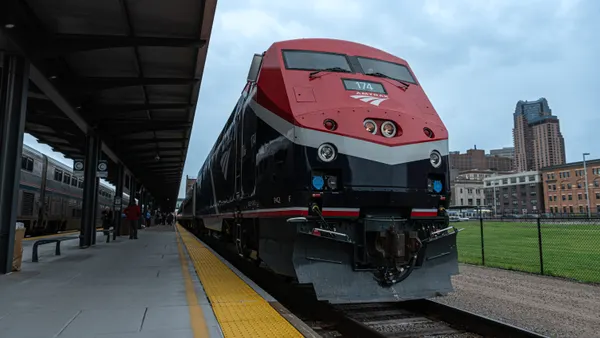Dive Brief:
- Yesterday, Las Vegas launched the country's first autonomous shuttle to operate on public roads. The free, eight-passenger vehicle rode along a three-stop, half-mile loop on Fremont Street and Carson Avenue in the downtown area.
- Shortly after the shuttle began running, it was involved in a minor accident when a delivery truck backed into it, grazing the shuttle's front tires. No one was hurt, and the truck was cited for illegal backing, according to the Las Vegas Review-Journal.
- The shuttle reportedly "did what it was supposed to do" and came to a stop as soon as its sensors detected the truck was backing up, according to a statement from the City of Las Vegas. The statement also indicated that testing of the shuttle will continue as planned.
Dive Insight:
While the accident is an unfortunate hiccup in Las Vegas's plan for innovative vehicles, there are a few lessons that cities can learn from this incident. The first: autonomous vehicles are not foolproof, nor have they reached their full potential.
A main criticism of this incident is that the shuttle didn't have the functionality to move out of the way of the delivery truck — which, yes, is a disadvantage of today's autonomous vehicles. However, it is not unlikely that the technology in these vehicles will continue to advance. Developers and engineers can use this incident and others that are similar as a case study for how to make AV functionality more realistic and dependable moving forward.
Another lesson is that human drivers may not yet be ready for autonomous vehicles on the road. While this driver was cited for illegal backing, he or she may not have known the vehicle behind the truck was autonomous — and, in turn, may have expected the shuttle to react to the truck's movements. When rolling out these AV pilot programs, it is crucial that cities inform other drivers on the road that an autonomous vehicle will be on the streets, and educate those drivers on how to share the road with the AV.
One thing that has been made clear is this accident will not deter the City of Las Vegas from moving forward with the pilot program. In a tweet, Nevada Sen. Catherine Cortez Masto wrote, "Las Vegas moving forward! Applying new technology will help our NV communities become better connected & improve our way of life." City leaders have prioritized smart traffic innovation, and a minor graze of the tires is not going to stop that from continuing.












